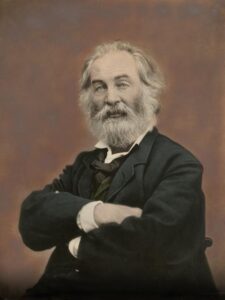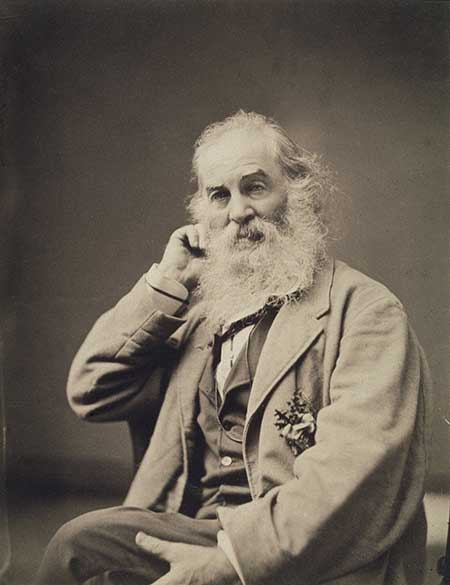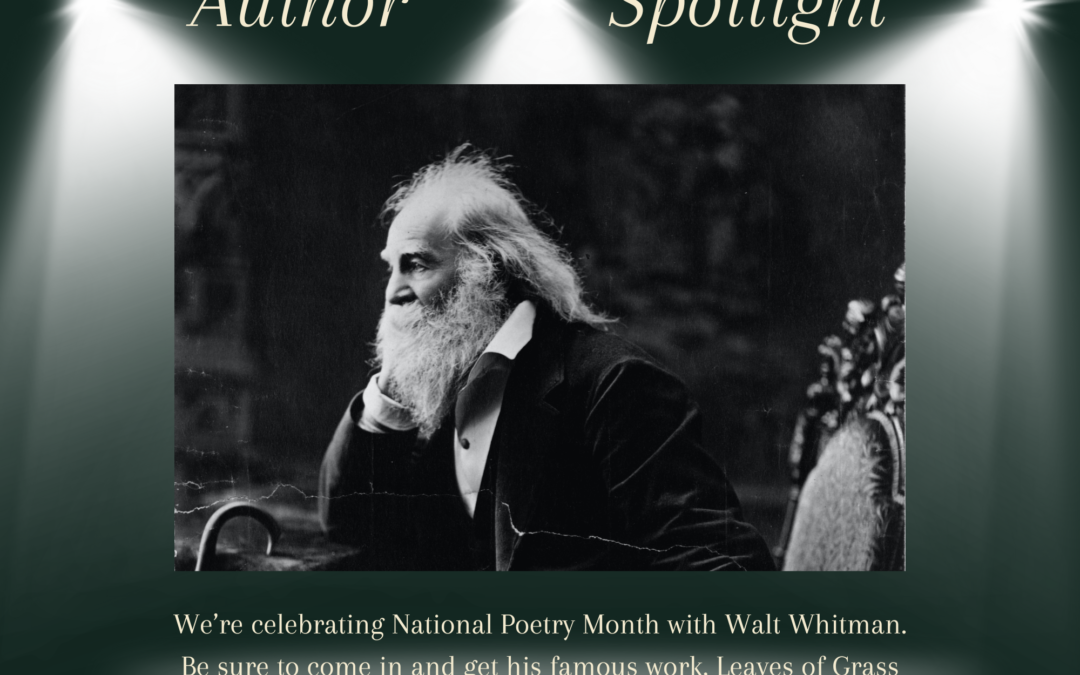Walt Whitman was born in West Hills on Long Island on May 31, 1819. Whitman’s father moved the family to Brooklyn when he was little. Walt was one of the first generation of people born in the newly formed United States. He attended the first public schools in Brooklyn with other children from poor families and finished school at the age of 11. He was hired as an office boy at a well known Brooklyn law practice. At the practice, he was given a subscription to the circulating library and began self teaching himself about literature and writing. In 1831, Walt became an apprentice at the Long Island Patriot, a working class liberal newspaper. It was working at the Patriot where Walt saw how words and sentences could shape language and ideas. When he was 12, he was writing articles for the paper and one of his articles is in the Mirror in 1834. The rest of the Whitman family moved back to West Hills in 1933, leaving Walt on his own.

Between 1834 and 1846, Walt had jobs with other newspapers, schools and eventually became a journalist. At the Brooklyn Daily Eagle, he was the editor but was fired when Walt supported the Free Soil Party*. After getting fired, Walt went to New Orleans to write about the anti slavery movement. Upon returning to New York, he went into Real Estate while he figured out what to do next. It was during this period (1850 to 1855) that Walt started writing. Throughout his career thus far, Walt was publishing stories and poems in several newspapers. In the spring of 1855, Walt wrote enough poems that he wanted to publish them as a collection. Unfortunately, he was not able to find a publisher to print the collection, so he printed the book with his own money. This became Walt’s famous book, Leaves of Grass. Poet and essayist, Ralph Waldo Emerson praised the work and wrote to Walt about his admiration for the “wit and wisdom” Walt has. Almost immediately after the release of the first edition, Walt began creating the second edition. For the new edition, Walt wanted the book to be “pocket-size” so that readers could leisurely read whenever they wanted to. On the spine of the book, Walt included some of the positive remarks from Emerson along with putting the full letter in the back of the book. This was done without the permission of Emerson. Whitman wrote reviews of his work and put those in the back of his book as well. There were new poems added including Crossing the Brooklyn Ferry (Sun-Down Poem). However, both editions were not financially successful.
*The Free Soil platform openly denounced the institution of slavery, demanding that the federal government abolish slavery in all federal districts and territories.
Song of Myself (1892)
I celebrate myself, and sing myself,
And what I assume you shall assume,
For every atom belonging to me as good belongs to you.
I loafe and invite my soul,
I lean and loafe at my ease observing a spear of summer grass.
Excerpt from the Poetry Foundation
With the outbreak of the Civil War, Walt’s brothers George and Andrew enlisted while Walt and his other siblings did not. George told Walt about the union soldiers, their mentality, and the state of the war. The union troops were starting to send wounded soldiers to New York and Walt regularly visited the hospitals. He wrote about the experience for the New York Leader. In 1861, Walt went to Washington DC to care for more wounded soldiers. The Civil War made Walt significantly rethink Leaves of Grass. As Leaves embraced the good of diversity and togetherness, the new reality of war sent a wave of disillusionment. In late 1862, Walt feared that his brother George was on the list of the wounded and raced to Virginia to find out. Walt found his brother in Fredericksburg and was relieved that George wasn’t severely injured. At the Fredericksburg hospital, Walt saw carts full of amputated body parts that would affect Walt’s poetry for years to come. In 1865, Walt published his civil war poems, Drum-Taps. Drum Taps are poems in free verse with themes of excitement to the horrible realization of war. Poems of disillusion are shown in “Beat! Beat! Drums!” and the depth of suffering of the wounded in “Vigil Strange I Kept on the Field One Night”. In the sequel of Drum Taps, Whitman includes poems on the death of President Lincoln “O Captain! My Captain”.
O Captain! my Captain! (1865)
O Captain! my Captain! our fearful trip is done,
The ship has weather’d every rack, the prize we sought is won,
The port is near, the bells I hear, the people all exulting,
While follow eyes the steady keel, the vessel grim and daring;
But O heart! heart! heart!
O the bleeding drops of red,
Where on the deck my Captain lies,
Fallen cold and dead.
Excerpt taken from the Poetry Foundation

Whitman’s friends in Washington helped get him a job in the Indian Bureau of the Department of the Interior. His time working with the Bureau translated into poems, “Osceola” and “Yonnondio” where he reflects the inevitable loss of Indigenous cultures*. Just when Walt was feeling accomplished in his work, James Harlan became the new Secretary of the Interior. Harlan was placed in the Interior to get rid of the non essential workers and others who Harlan did not like. Whitman got his notice on June 20, 1865 and took the note to his friend in the Treasury Department, O’Connor. Assistant Attorney General J. Hubbley Ashton spoke to Harlan, who was getting ready to blacklist Whitman from other Agencies. Harlan agreed not to blacklist Whitman. The following day, Attorney General James Speed hired Walt. O’Connor wrote a fifty page letter denouncing the actions of Harlan and taking advice from Walt, the letter was named “The Good Gray Poet”.
*Believed that the Indigenous Peoples names for locations are far better than the European influences
In January of 1873, Walt suffered a stroke and was left partially paralyzed. He moved to Camden, New Jersey shortly after his mother’s death and lived with his brother George. In 1892, Walt Whitman died at the age of 72. At his wake more than 1,000 people came to pay their respects, and at his funeral, attendees could not see the coffin due to the amount of flowers. Whitman donated his brain to science at the American Anthropometric Society in Philadelphia but was dropped by one of the students.
Walt Whitman is regarded as one of the most influential poets in American history. He pioneered the free verse style of poetry that broke away from the structures of the day. Whitman is one of the most studied and read poets in the world.
Sources
Whitman and Race – https://www.pbs.org/wgbh/americanexperience/features/whitman-and-race/#:~:text=Yet%20Whitman%20thought%20slavery%20abhorrent,the%20voice%20of%20the%20oppressed.
Walt Whitman: America’s Poet – https://www.nypl.org/events/exhibitions/waltwhitman
The Walt Whitman Archive – https://whitmanarchive.org/
Poetry Foundation – https://www.poetryfoundation.org/poems/45474/o-captain-my-captain
Poetry Foundation – https://www.poetryfoundation.org/poems/45477/song-of-myself-1892-version
National Portrait Gallery – Walt Whitman –https://npg.si.edu/learn/classroom-resource/walt-whitman-civil-war-poet-and-caregiver
PBS website: Walt Whitman – https://www.pbs.org/wgbh/americanexperience/films/whitman/


Recent Comments